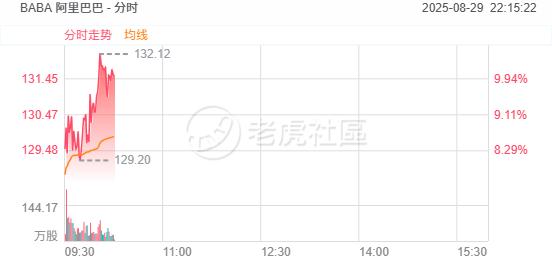Alibaba surges strongly after earnings, Group CEO says AI investments are starting to show results
On Friday, Alibaba performed strongly after its earnings release, surging over 10% as of press time. In terms of news, the company’s Q2 fiscal revenue grew by 2% year-on-year, lower than expected, while net profit soared by 76% to 42.4 billion yuan, mainly due to gains from changes in the fair value of equity investments. Instant retail business revenue grew by 12% year-on-year in the first half of 2025. Alibaba Cloud revenue increased by 26% year-on-year, and AI-related product revenue achieved triple-digit year-on-year growth for eight consecutive quarters. Capital expenditure surged from about 11.9 billion yuan in the same period last year to about 38.7 billion yuan this quarter.
During tonight’s conference call, Alibaba Group CEO Wu Yongming stated that Alibaba owns the world’s fourth and Asia’s top cloud, and possesses full-stack technical capabilities from AI computing power, AI cloud platforms, AI models, open-source ecosystems to AI applications. This quarter, Alibaba’s Capex investment in AI+cloud reached 38.6 billion yuan. Over the past four quarters, more than 100 billion yuan has been invested in AI infrastructure and AI product R&D. Alibaba’s investment in AI has begun to show results. Whether it’s Alibaba Cloud’s rapid growth driven by customers’ AI demand or the AI experience upgrades in a wide range of to-C and to-B scenarios, the AI-driven path for Alibaba’s rapid growth has become even clearer.

Alibaba stated during the conference call that Taobao Flash Sale’s monthly active users have reached 300 million, a 200% increase from April, and that flash sales and instant retail are expected to bring 1 trillion yuan in new transactions over the next three years.
In addition, there are reports that Alibaba has developed a new AI chip to fill the gap left by Nvidia in the Chinese market. According to sources, this new chip is currently being tested and is designed to serve a broader range of AI inference tasks, and is compatible with Nvidia. The new chip is no longer manufactured by TSMC, but instead by a domestic company.
Disclaimer: The content of this article solely reflects the author's opinion and does not represent the platform in any capacity. This article is not intended to serve as a reference for making investment decisions.
You may also like
Data-Anchored Tokens (DAT) and ERC-8028: The Native AI Asset Standard for the Decentralized AI (dAI) Era on Ethereum
If Ethereum is to become the settlement and coordination layer for AI agents, it will need a way to represent native AI assets—something as universal as ERC-20, but also capable of meeting the specific economic model requirements of AI.

Who decides the fate of 210 billions euros in frozen Russian assets? German Chancellor urgently flies to Brussels to lobby Belgium
In order to push forward the plan of using frozen Russian assets to aid Ukraine, the German Chancellor even postponed his visit to Norway and rushed to Brussels to have a working meal with the Belgian Prime Minister, all in an effort to remove the biggest "obstacle."
The "Five Tigers Competition" concludes successfully | JST, SUN, and NFT emerge as champions! SUN.io takes over as the new driving force in the ecosystem
JST, SUN, and NFT are leading the way, sparking increased trading and community activity, which is driving significant capital inflows into the ecosystem. Ultimately, the one-stop platform SUN.io is capturing and converting these flows into long-term growth momentum.

